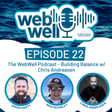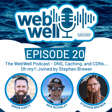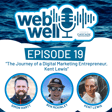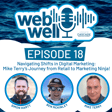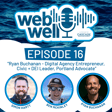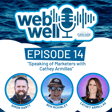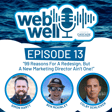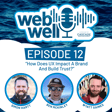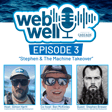Introduction to the Podcast
00:00:06
Speaker
Welcome to the Web Well podcast brought to you by Cascade Web Development. I'm one of your hosts, Simon, along with Ben. And we can't wait to dive into all things internet, tech, web development, and web design.
00:00:20
Speaker
We'll also be discussing how we balance work and life and exploring the fascinating world of internet innovation. So whether you're a tech enthusiast or just looking for some entertainment, join us on this exciting journey as we explore the ever-changing landscape of the web. Thanks for tuning in and let's get started.
Episode Overview with Zach Heider
00:00:40
Speaker
All right, well, good morning, everybody. Welcome to the Web Well podcast episode number eight. We're very excited to include Zach Heider from Hubble Communications in today's podcast. Of course, I am here with Simon Hart, who we co-host this podcast a couple of times a month. And today's topic is a pretty fun one. The idea is no more free pitches and RFPs.
00:01:07
Speaker
So really excited to unpack this conversation with Zach. I know he's got a ton of experience in this realm, and welcome Zach Heider. Great, great to be here, gentlemen. Thank you for the invite to talk about this.
The Challenge of Free Pitches
00:01:23
Speaker
And I will say, Ben, just to amend the title there, it's maybe not no more free pitches, it's just very selectively
00:01:35
Speaker
deciding when you're going to sort of give up your time for free. But this is a topic I love. This is something I've worked on my entire career and it's become a little bit of a passion topic for me, because it's difficult for agencies to figure out how to do this.
00:01:49
Speaker
Yeah, no, and I think it'll be wonderful not only for agencies to consider how they can and perhaps should show up to protect all of us, right, and the value that we do present, but also helpful for clients because, you know, they're oftentimes raised in cultures and see things on, you know, Mad Men and other types of shows and documentaries where it's kind of a common practice and they might even be getting that from their leadership.
00:02:17
Speaker
nuanced and it's always fun to chop it up and get your perspective on this as I continue to try and refine how we go about this subject as a general focus point. Did you like that tag on LinkedIn, Ben? That was very timely, I thought. It really was.
00:02:34
Speaker
Yes. He sent me a link to a Mad Men clip where Don Draper was getting pressed by an apparently very successful authoritative individual and I think Don mentioned, well, I don't think you got in the executive suite here by giving stuff away for free and then very gracefully provided some input and hopefully teed it up for some future work together.
00:03:03
Speaker
Well, I'd love to start off with that link. Go ahead. We'll have to share that link. Yeah.
Zach Heider's Background and Career Journey
00:03:10
Speaker
We'll share that in the show notes for sure. But just a brief history of looking at my relationship with Zach, which I think goes back now, pushing 10 years.
00:03:21
Speaker
And my first awareness of Zach was when he was in leadership Portland. I had gone through leadership Portland a couple of years ahead of Zach. And I can't remember when you did it. I did in 2008. Do you recall when you did that? I was the class of I think, 2011. Sounds about right. And that's right. How did we meet? Because I remember you and I talked on the phone
00:03:46
Speaker
But I can't remember what it was about. Well, I was the leadership Portland Alumni Association director, which got me a courtesy spot on the Portland Business Journal board of directors. And so I remained quite close to leadership Portland groups that went through. And it should come as no surprise that kind of bubbled up.
00:04:06
Speaker
in the hierarchy of leadership Portland class of 2011. So I think I found myself interacting with you on that. You were doing some speaking or different things and certainly at graduation, you may have been the graduate speaker at graduation perhaps. Like class speaker. I don't know how that happened, but that's right. That's yeah. And then you guys, you were forming like a work group or something and I think you interviewed me and God, that is a long time ago.
00:04:36
Speaker
Yeah, it takes it takes it back a little bit there. So that was pretty fun. I think we had a chance to work together, at least interact a bit when you were when you were serving as creative director and vice president at Quinn Thomas. I believe the way the story goes is they used to be a client of ours. And then Zach came in and said, there's a better way. We're just going to throw this thing on WordPress. So there's that. But hey, you know, you know, partnerships. Talk to me, Ben, when you tell these stories.
00:05:02
Speaker
Nothing but love, Zach, nothing but love. He then went on to found the Dendro Group after moving away from Quinn Thomas. And this is, as LinkedIn promotes here, providing business development, brand positioning, and new client pitch council to executive leadership in communications, advertising, public relations, and digital marketing agency space.
Transition to Hubble Communications
00:05:24
Speaker
It turns out I was the first Dendrocast interview that Zach had. So we walked down that path together and it was on culture. I really enjoyed that conversation with you and I would highly recommend anyone go back into the Dendrocast archives. Some really good content there with some excellent
00:05:45
Speaker
agency folks that really from around the country that Zach's interacted with over the years and touching on some timely topics as well as some evergreen content for everyone to enjoy. I'll keep going. As part of that, Zach launched, as I mentioned, the Dendrocast. I was on that, met a great group of folks associated with that. And I remember I actually went out to a Dendrocast gathering, I believe after the first year, and drove out there with Ward Hubble.
00:06:14
Speaker
and had some great conversations with Ward about his agency and business and now he was looking at succession and then it wasn't very long after that and I was notified hey Zach's going to be coming on board and helping with the leadership transition at at Hubble Communications which was really exciting to hear in terms of seeing how they were going to go down that path together and and lo and behold it was right in the heart of the I believe the kind of the nadir of the
00:06:40
Speaker
the pandemic. And so the work remote, hey, who's the new guy? What about other plans that were laid, etc. So really fun to observe that. And, you know, both from from Zach's perspective and wards and see the organization evolve over the last several years.
Community Engagement through Podcasting
00:06:58
Speaker
Let's see. And then one thing that I found interesting is Hubbell continues to create some really compelling content around community issues. It's called the Better Communities Podcast. And really enjoyed the format that they've used, seeing how that's evolved and kind of grown from Dendrocast and now been this pretty important part, I feel, to the content and the way that Hubbell is showing up in the marketplace.
00:07:24
Speaker
So those are some of the details that I'm aware of. But Zach, if you want to take us back a little further, I believe you're not a Portland native. I see you're a Red Sox fan. Maybe you could just kind of fill in some gaps there in terms of how you found yourself in the agency space and in Portland, Oregon. Wow. Well, that's a very generous introduction set up. I don't know that I can add too much more. That was very well done. I wish every introduction was as gracious as that. So thank you.
00:07:52
Speaker
Yeah, I mean, I am technically a Portland native. I'm actually an Oklahoma native, but I don't tell very many people that. So your listeners now get to know that fun fact about me. No, but I grew up here in the Portland metro area. I've been here since I was five or so years old. I did go to college in the Boston area. So yes, I am a Red Sox fan.
00:08:15
Speaker
Thank you for letting me wear this. This is technically a vacation day, so I didn't prep myself nearly as much as I should.
Competitive Nature of Agency Work
00:08:25
Speaker
I'm an agency creature. I spent a brief stint in TV news, which was a disaster, and I'm glad I got out of it.
00:08:35
Speaker
and immediately worked in the agency world and have been there ever since. And here's the thing, it is the most wonderfully horrible business. And what I mean is it's so fun. You get to be creative. It moves fast. You have a lot of diversity. And yet it is incredibly competitive. Clients can be very difficult.
00:08:59
Speaker
you know, Ben, you and I were just talking over beers about the chat GPT AI joke that don't worry in the agency world, we're safe because clients still have to tell you exactly what they want. The joke being they never seem to know what they want. And it's a hard business. There's a lot of agencies, not just in the Portland Metro area. There's a lot of agencies that I think Gina Mafey, our vice president at Hubble
00:09:26
Speaker
always says that at the end of the day, every agency is the same. She's not wrong. The services most agencies provide are pretty standard. It's the differentiation of really what makes you special. Is it an approach? Is it a mindset? Is it a philosophy? How you position yourself is what really sets you apart. And most agencies just don't do that very well, right? They sort of are generalists. They exist to sort of service clients, make clients happy.
00:09:57
Speaker
And I've spent a lot of my career really just trying to sort of understand more, like what makes a great agency great? What makes an agency grow? What makes agencies die? You mentioned my consultancy that worked with agencies on just business, their business problems. So not client problems, but just their business problems. And in the almost five years I was doing that, watched a couple of agencies go away.
00:10:25
Speaker
It happens, very successful ones. These were 30, $40 million firms that were very big in their space who no longer exist, right? So I'm fascinated by the agency business because it is such a fun, crazy thing to do for a living.
00:10:43
Speaker
Awesome, awesome. Well, we're excited to have you here. This is going to be a fun topic. So again, kind of kicking things off. Why agencies should stop pitching for free and doing RFPs. And again, slightly adjusted how to narrow our focus when it comes to those types of constructs so that we're setting ourselves and our clients up for a successful engagement.
The Decision on Free Work
00:11:04
Speaker
Does that sound about right, Zach? Yeah, that's a great topic.
00:11:09
Speaker
Indeed. So as I mentioned previously, got a great little clip of Don Draper, you know, very
00:11:16
Speaker
capably and effectively shooting down a request for free work, but setting an entree for opportunities to have a meaningful conversation that could turn into a paid engagement. I think that is, you know, having that in your back pocket or at least a perspective on that should a client make that request. It's really smart for all of us. But by way of stories, Zach, have you ever had any experiences that you could share with us here in the audience
00:11:41
Speaker
where you found yourself in a situation where someone was asking for free work and how you might have addressed that.
00:11:47
Speaker
Oh, yeah. I mean, sometimes I think to myself, you know, I've been at a few agencies in my career, and I think to myself, you know, how much if every single one of those, you know, situations where you're asked to do something for free, or, I mean, I think one of the mistakes a lot of agencies make, Ben is we offer to do free work, because we think we're going to ingratiate ourselves, or we think that that is the only way to win business. But I go back in my career, and I think, Wow, I mean,
00:12:16
Speaker
I mean, millions of dollars in free work I have done in my career with teams that I've worked with. And I think again, clients don't know what they can or cannot ask for, but agencies are also very willing to give them things that they should not give and they should not be asked for. And I think that this is as much a client problem as it is an agency problem.
00:12:46
Speaker
And we have trained ourselves, I think as an industry, we the agency business have trained ourselves to think that that is the only way to win new clients or keep existing clients is to always be giving more than we should. And I don't think there's almost any other business in the world. It's one of the reasons why that Don Draper quote is so
00:13:09
Speaker
poignant is I think it's it's Conrad Hilton that he's talking to, right? Am I remembering? Right. I mean, do hotels just give away free rooms? Probably not. Again, I'm not on the hotel business. But the point is,
00:13:25
Speaker
not many industries will do that. Because because so much of what we are selling in our business is our time, and our brain, it can be tempting and easy to say, Okay, well, I'll give you my time, I'll give you my ideas. But that is really our two most valuable assets are our time and our ideas. Yeah, why would we give away those things for nothing, right? Right. So it's, it's difficult to sometimes know when to say no, how to say no, or
00:13:54
Speaker
to sort of do what Mr. Draper did so effectively redirect the conversation towards something that is of value to both. And it's very difficult for agencies to know how to do that. And I've been in many rooms, Ben, where I've heard people say, well, you know,
00:14:12
Speaker
clients always right. And I hate that. I hate that expression. No. Sometimes I don't think the client knows what else to ask for. It's just, that's how we've always done it. You know, put together an RFP doesn't tell them a whole lot. There's not a lot of information in it. Let's make them guess. Let's not tell them what the budget is and see if they come in lower. That's one of my favorites. Yeah, right. But let's let's see if they give us some free ideas. And
00:14:40
Speaker
You know, I just think what's a terrible way to grow your business. It just is very time intensive. So yeah, you know, one thing I found in our business is oftentimes we're responding to people coming up and saying, Hey, we have a need.
00:14:55
Speaker
And then we're trying to identify, is there a good fit? If there is, let's keep going. If not, perhaps not. But oftentimes, we're saying, you tell us what your business is all about, and we'll tell you how we can help either optimize that, but certainly automate that with online tools.
00:15:11
Speaker
I do recall a period, though, where one of my previous colleagues here at Cascade had this idea of a video contest website, this notion of going to a brand and saying, hey, brand, we we've got this vision we could create this video context website. You then can via social media and email newsletters solicit videos back and the winner receives a thousand bucks worth of it.
00:15:36
Speaker
you know, apparel and, you know, exposure on your website, et cetera, et cetera. Maybe there's actually there was going to be a video presentation at the end of all of the submissions. And they're going to make this whole brand, you know, effort around that. Well, this this local, very notable apparel company said, no, no, thanks. We'll pass literally a month later. That exact vision and the mock up framework that we delivered to them as this idea was launched and they were off and running.
00:16:06
Speaker
They just used their existing agency and it was a brutal lesson to learn.
00:16:11
Speaker
And again, we're not in that zone really where a company is coming and saying, or an organization and saying, we need a fresh brand perspective, a campaign, hit us with your best idea. And we're like finding that little nugget that in that nugget, that kernel rolls out all of these brilliant ideas and executions. But I know a lot of folks in the creative space are in that realm. And as I recall, when I first started this business, I remember
00:16:36
Speaker
talking to some agencies and they say hey the way we approach pitching is we try and get a wrap arms around what the budget is and then we'll dedicate up to 20% of that budget toward the pitch and the creative and the ideas and the brainstorming in hopes of winning the business.
00:16:53
Speaker
And we'll put in a little footnote that says all of these ideas are the property of our agency unless we get this work, then it really plays out. And so that was shocking. 20%, you're thinking about a project that's 100,000, 200,000, $300,000 budget, and people are just blowing all their time resources. I just look at that and go, man, losing in that way would have been devastating to me. So what might be helpful for us here, Zach, in your mind, how do you define pitching?
Evolving Pitching Strategies and Client Relationships
00:17:23
Speaker
Like, where does that start it in? Because obviously, you've got to get them a proposal, or at least an outline of process, and timeline, scope, and budget. But how do you define pitching, and where does that line get drawn in your mind? I mean, that's a great question, Ben. Because for me, pitching has evolved. I mean, just to share a little bit of my experience, how I learned how to pitch. And by the way, I will say, I am a person who loves pitching.
00:17:51
Speaker
Ask anybody at Hubble. Ask my colleagues I've worked with at other agencies. I'm the guy that loves going in a room and talking to new people about new problems and new things. Love it. It's one of my favorite things to do.
00:18:06
Speaker
However, I have learned that there are ways you should not do it and there are ways to do it that can be far more effective at helping you win business, land new clients. I used to be in the agency world where it was all about the
00:18:23
Speaker
the the gimme right it was what do you and I have actually been in pitches where I've I've heard the judges say okay well this is the part where they're going to they're going to tell us all the stuff they're going to do for free or this is the part where they're going to wow us with their new ideas and I used to pitch like that I used to think that was the expectation because that was the environment that I was in
00:18:46
Speaker
I did a pitch for a big piece of business, big campaign down in Texas. Oh man, this is probably almost a decade ago. And I am not kidding. After the presentation, we had orchestrated the side doors in the room where we were on to open. And we brought the client out into the parking lot and showed them a wrapped vehicle that was very, that was mocked up to look like what we were going to do with them for this road tour we were going to do.
00:19:15
Speaker
We did it all on spec. I mean, that, that cost, that pitch probably cost us $50,000. Now we got the business, but you know, it's terrible. We actually, this was an incumbent pitch. We already had the business. And it's one of those things where I think sometimes that happens to agencies. It's like, well, we won the business. So it must've worked. And it's like,
00:19:38
Speaker
But we don't know cause and effect there. Did we win the business because we spent 50K and wrapped the bust with their logo and all of our stuff? Did we win it for the new idea?
00:19:50
Speaker
So one of the things I started doing when I was consulting, not just when I was consulting, but I started doing when I was in the agency environment, is really always making sure I went back to the client certainly when we lost, but certainly when we won to say, okay, tell me exactly why you hired us.
00:20:11
Speaker
Because if you lose, that information is really valuable. One of the things that drives me nuts is when I had a pitch that I lost with an agency a while back. And they were like, oh, you guys were great. And I'm like, but you're not telling me why we lost.
00:20:28
Speaker
Yeah, you guys were really great. There's a reason you chose somebody else. It's okay. That's one of the things we have to tell clients is like, it's okay to tell us why you didn't hire us. We're adults, but getting that feedback on, you know, the chemistry was off, or, you know, sometimes it's
00:20:47
Speaker
We just didn't have a good feeling about your understanding of this particular problem, or it's a service category that you didn't offer. That's super good feedback. But what I found in doing that is that 95-ish, if not more percent of the time, we never won because of an idea. In fact, sometimes the idea was a liability. Like, wow, we really loved your approach, but we weren't really sold on your idea.
00:21:13
Speaker
And oftentimes, it really was about process. It was about how are you going to work with us to come up with the idea? And it was kind of this light bulb moment of like, the close isn't the wrapped vehicle in the parking lot that you surprise them with at the end. It's never that. It's, wow, I really felt like Zach and Gina and Nathaniel, people from my current team right now,
00:21:39
Speaker
I just felt like they gelled together as a team and they worked really well with us and that's why we got hired. So all the free stuff that we do and the investment, it still takes time but we don't often for that reason go in with these fully baked strategies and here's all the things we're going to do and here's a mock-up of the billboard that we would recommend.
00:22:03
Speaker
It really is just going in and connecting with those people, having conversations, feeling, asking them questions, feeling their pain and not trying to be the smartest agency in the room with the flashiest stuff. So that's, the question was, how do I define pitching? I'd say it's evolved. And today I define it as a great pitch is actually not a presentation. It's a conversation.
00:22:31
Speaker
Yeah, no, I couldn't agree more. And I think about some sales training I got a number of years ago with an organization called Sandler Selling. And while the gentleman is a New Jersey stereotype from the 1960s and some of the ways he approaches it and voices it, in fact, I'd be curious to take it again now. I've got to imagine some softening was required in the age we're living in now. A lot of those same things ring true in terms of like,
00:22:58
Speaker
that he talks about, don't spill your candy in the waiting room. Instead of hitting them with all of these things you could do, it's more of a matter of what do you care about? How do we surface those things? How do we identify we hear them? And then how do we respond to those needs in ways that can find a solution within the constraints of the scope, timeline, and the budget? So a lot of that resonates with me 100%. Well, great. The next topic,
00:23:28
Speaker
that is tied to this pretty closely is the notion of RFPs.
Critique of the RFP Process
00:23:32
Speaker
As I mentioned previously, they do seem to be a requirement in a lot of organizations. I think about government organizations, larger organizations that have processes, procurement departments, they gotta get at least three responses, et cetera. I guess, what's your beef with RFPs? Well, can I, so am I allowed to use an expletive on this podcast? Are we
00:23:53
Speaker
Do we have an E rating? What's the rating? I can never remember. What's the rating for podcasts? Use your creative license. Use my creative license. Okay. Well, I have taken to calling RFPs really that, you know, they stand for requests for proposal. Yes. I have started calling them really fucking pointless.
00:24:16
Speaker
Because here's the thing about RFPs. They are mostly pointless. I have never written a proposal, responded to an RFP that hasn't just pretty quickly gone into the garbage. I think clients don't know what else to do but put out an RFP.
00:24:35
Speaker
But we, so I was just having a conversation with our team a couple of weeks ago. We've gotten a few RFPs, you know, lately. And here's the thing, if we don't have a relationship with that organization or a person there, if we didn't know that RFP was coming, by the time we get it, it is really fucking pointless for us to respond to it, right? Because you're one, you're just in a pack of many.
00:24:59
Speaker
you're reacting and agencies do this. We all do this. I'm guilty of it. Oh man, they're going to love it when they see our stuff, right? But remember, just like I was saying, to quote Genome F.A., all agencies are kind of the same. Every one of those proposals is going to have 95% the same information. There's no way in a proposal
00:25:21
Speaker
for those things I was saying that matter most, chemistry, how you come across in the room, how you think, how you interact with them to sort of leap off the page. So the reason I don't like them is I do think they're fairly pointless, but clients don't know what else to do. And with no disrespect to our clients out there who we, of course, love or prospective clients that may want to hire us,
00:25:48
Speaker
I think sometimes clients do RFPs because it's a lazy tool to force the work onto the agency. We don't really know what we want, but we're going to put some words on the page and we'll send it out there and see what they do. It's a lazy way of starting a conversation because what's the first thing we're going to do? We're going to say, we have a million questions.
00:26:09
Speaker
that you don't really speak about. What's the real problem? Like, why do you want to do X, Y, and Z? Is that even your problem? So what we have started doing at Hubble, which has been very effective for us, is when we receive an RFP, is to reach back out to them and say, hey, thank you for thinking of us. Thank you for standing this over.
00:26:28
Speaker
And we ask two questions. One, what made you think of Hubble? And our founder, Ward, he thinks of this very differently. If they say, well, we just Googled PR firms Portland and your name came up, I'm like, then we're probably not seriously being considered here. And we shouldn't bother. Ward likes that stuff. And we showed up in search results. We should respond.
00:26:57
Speaker
So we ask, you know, how did you find out about us? And sometimes it's like, oh, we heard your podcast or we saw, we met Gina at an event last week. That's more personal. Okay, now there's a reason you're actually thinking of our firm. But the second question we ask is, we would prefer not to do a proposal, we'd rather have a meeting. And so can we just dispense with this proposal business? And it's amazing how many clients
00:27:26
Speaker
are like, oh, sure, absolutely. And that to me is the thing that a lot of agencies are afraid to ask. Yes.
00:27:34
Speaker
that sometimes it is really just a product of going in and taking control of a situation where I think agencies are told they're not supposed to have control. So I'm a very big believer that when you receive something that doesn't make sense to you, that seems to use the RFP term really fucking pointless, that you know is probably not going to land you the business, but well, let's just do it and see what happens. Take control of that situation and say, look,
00:28:04
Speaker
That's not how we do things. That's not the most productive use of our time or your time. Could we do this differently? Could we have a meeting or could we at least be able to come in and present to you kind of who we are, how we think so you can meet the team? I find most times clients are very amenable to doing that.
00:28:23
Speaker
and willing to sort of, you know, break, break their own rules with the whole RFP business. I hope that answered your question. No, absolutely. And what I would call that broadly is a pattern interrupt, right? They send out the RFP, they're expecting a very specific response cadence and tenor. And you're basically saying, Hey, what would you think about
00:28:44
Speaker
kind of throwing that out and just having a conversation, right? And then all of a sudden, you get to build the bonding and rapport. You get to see if there's a good fit. You get to ask the questions. And I'm a big believer, kind of to your point earlier, that it's not so much about what you say or provide back. It's more about the kind of questions that you ask.
00:29:03
Speaker
right? And those types of getting them to think a little bit differently and sharing that we've got a different perspective to offer here, that could be really valuable. So I agree 100%. I think so Blair ends who is a really amazing agency consultant. He has a fantastic podcast he does with David Baker called to Bob's encourage any agency owner leader out there to listen to it. But Blair talks a lot about this problem. And one of the things that I heard him say,
00:29:32
Speaker
At some point that really stuck in my brain is that for every. I'm gonna screw this up so apologies player if i'm not explaining it correctly but basically for every rule you get the client to break with their rfp your chances of winning that business increase right.
00:29:49
Speaker
So if you can start by saying, hey, we really would rather not do a proposal, we'd rather have a meeting. If they agree to that, your odds increase. If they then say, hey, could you put together a line item budget of what each individual thing's gonna cost and you say, we actually, we don't know. We don't know what our paid media budget would be. It's all gonna be speculative, but what we could do is we could provide you with
00:30:14
Speaker
a scope of work that explains how we might be able to identify some of those costs. And if they agree to that, your odds increase. So every time you're in control of your own pitch process, of your own prospecting process, your odds of winning that business go up. And I think that's a great rule. I've seen that. That's not just Blair, I think, offering an opinion. I think that is anecdotal. We've certainly seen it. I've certainly seen it.
00:30:40
Speaker
but agencies should not be subservient to clients. And I cannot tell you the number of people, Ben, who in our business think that's how it works. Clients always write, client comes first. No, we say partnership. A lot of people are like, oh, we're your partner. Well, fucking act like it. I'm always amazed at the agencies that are like, well, we're partners with our clients. And I'm like,
00:31:07
Speaker
why don't you act like you are, right? Why is the answer to everything they want? Yes, it should be, well, wait a minute, help us understand why this is a problem, right? And those are just more interesting conversations. Yeah, and including that notion of valuing people's time. I can't tell you how many times people call me at 5.30 on a Friday and like, we got a problem. I need this by this time and I need you to do it. And it's like, I think you have a problem.
00:31:34
Speaker
It wasn't about, you know, you claiming our time whenever you want it on a weekend. Like we have, we are humans, we have lives, we have other responsibilities. And that's just as a flash point, right? Where I've certainly had that situation where people are hitting me up and it's like,
00:31:50
Speaker
clear the decks the whole week and I need you. And I want to make sure, you know, at the onset, they understand we're not the best fit if that's the kind of partner you need, because I don't feel like you're doing your work. You're just not doing your work and then putting it on us at a time where we're not being put in a position to be successful, whether it's over a weekend or just a very, very short timeframe.
00:32:08
Speaker
And I think that that's such a good point, Ben. I think that shows up a lot in the dreaded RFP process as well. They spend six months figuring out what they want, and then they put it into an RFP, and then they give an agency two weeks to respond.
00:32:27
Speaker
and i mean that's just not enough time it never is because we're not sitting around with nothing to do i mean this we're in the we're in a time services business you know the margins on that time are are always stretched so two weeks to respond to this thing that took you six months to figure out and you know more about this than we do
00:32:48
Speaker
and we get two weeks and you take six months. And again, that's another thing that we often ask for. Hey, thank you for sending this over. If it's something legitimately that we're interested in, we try to move the date. This is perfect opportunity. We think we'd be really a good fit for this.
00:33:06
Speaker
But we can't make your deadline. Can we move it out a week, two weeks, whatever it needs to be? Again, to quote Blair Enz, if they give on that, your odds have gone up, right? So always being in
Empowering Agencies to Say No
00:33:17
Speaker
a situation where you take control and do it from a position, I think to your point, Ben, of like, we're not going to do our best work, right? We're not going to do our best work at 5.30 on a Friday.
00:33:29
Speaker
or burning our team out over the weekend. So let's put ourselves, let's set ourselves up for success and do it in a way that is. Yeah. Yeah. No, I like that. I like that. Yeah. I've also found very similar to what you're talking about where, uh, you know, if I do get an RFP or if I'm talking to someone very early on and they're like, Oh, we're
00:33:46
Speaker
developing an RFP, oftentimes I'll offer to say, hey, would you benefit from someone to help you kind of frame up the RFP and put it out to the market in a way that people will be able to get you the apples to apples comparisons that your evaluation team needs to make an informed decision. And that sometimes has worked to our benefit as well. So it's so funny you say that, Ben. We have a $2 million piece of business right now at Hubble.
00:34:16
Speaker
that started because the client sent me the RFP and was like, can you help me explain what we're looking for? And I took a look at it and I was like, this makes no sense. You're not telling me anything other than like the history of your problem, which is part of the information someone would need. And just by coming in and saying, let me give you some guidance,
00:34:42
Speaker
marked the heck out of that RFP and sent it back. And it showed them like, oh, wait, you actually understand what we need, which then led to my favorite thing, which is led to a meeting, which then led to the business. Beautiful. So yeah, anytime someone's like, hey, would you take a look at the scope of work at RFP because we want to send it out, say yes, and then use that as your way to kind of walk through the door. Yeah.
00:35:08
Speaker
No, I love that. That it's not a, you know, roll your eyes and sigh and say, here we go again. But instead, here's an invitation to see how we can disrupt this process in a way that's productive for them and helps us get to a point where we can actually evaluate the fit. And of course, feeling empowered. It's a bit of a privilege and a luxury to feel empowered enough to walk away from that business. But I think the more that we flex that muscle and as uncomfortable as it can be,
00:35:36
Speaker
the better we set ourselves and our team and our entire organization up for success. I think along those lines, Ben, I think the most powerful thing that an agency can say to a client is no. And not enough of us say that word enough, right? We equivocate, we always feel the need to be apologetic, but
00:36:01
Speaker
when you're asked to do something that either doesn't make sense or quite simply is, I mean, you use the five 30 on a Friday example is quite simple, simply, you know, not possible by the laws of time and physics. The most powerful thing you can say is, I'm sorry, we can't do that and not offer the explanation and not offer the, you know, but here's all the things we will do. But just to say that is just not something that we're equipped to handle.
00:36:28
Speaker
and not enough agencies, again, that's about taking control of the situation. And so much of this, I think this conversation about, you know, free pitches and, you know, spec work and
00:36:42
Speaker
you know, all that stuff gets to something we operate from a position of fear in this business fear that we're not going to win the business that our competition might win the business. Or what if I hear this from our founder a lot? What if they never call us again? The truth of the matter is, is that's probably not going to happen, right? It's this belief that like, Oh my gosh, we have to or
00:37:08
Speaker
you know, the world's going to end. And I've been in this business long enough to know the world never ends, right? And there will be other opportunities. If it doesn't work out, then that probably is a good sign that it just it wasn't a good fit.
00:37:23
Speaker
We have, here's the thing, here's the other thing I hope we get to in this conversation before we wrap up, which is how many people listening to this podcast or even the two of you have like won a piece of business and you're so excited and you're like, oh man, this is awesome. We want it. They picked us, you know, we're the best. We feel so good about ourselves. But you go back and you look at all the compromises you made to win it.
00:37:46
Speaker
And within six months, you're like, we cannot stand this client. We hate this work. So I'm always like, why not get that over with early? If they're not willing to meet you in a place that's going to allow everybody to do your best work, that's your truest sign that they're just not going to be a good client. And we're so afraid that like, oh, but what if they're not going to hire us? What if they don't call us? Sometimes it's a blessing.
00:38:13
Speaker
Indeed. I've certainly seen that play out many, many times in the last couple of decades here at Cascade. And it is interesting because I know those feelings of desperation when it feels like the pipeline is empty and the workload is drying up and the team's looking at
Balancing Profit and Client Fit
00:38:27
Speaker
you. And as a business owner, you're thinking about year end bonuses and retaining your team with raises and other types of tools that require profit, not just revenue, but profit. And all of a sudden you start chipping away your profit potential to get the revenue.
00:38:42
Speaker
and then with that comes the more emotional damage around and this is a terrible experience and my team's not enjoying it and and so yeah I think again feeling like you can show up not feel like you need the business steer in a positive direction have some of those tough conversations early those things will really really help to set the table such that going forward everyone does feel like hey we're equals we are we are partners this isn't a situation where I started from a position of fear and now I'm
00:39:10
Speaker
operating every day with this fear that if I screw up, there's six people behind me in that RFP line that are just chomp at the bit to grab that business and move it forward. Yeah. Wonderful. Well, good. Let's see. Do you currently, I guess on average, when you think about a year at Hubbell, how many RFPs are you disrupting the process by responding to in some form or another?
00:39:39
Speaker
Gosh, honestly, Ben, I couldn't tell you the last time we responded to an RFP without blowing up the process. And part of it is, I'd say we probably get a couple of inquiries a month.
00:39:57
Speaker
you know, summer, summer squirrels, summer whales, squirrels are like, you know, $100,000 project or a $50,000 project and a whale is, you know, you know, half a million more, right? Yeah. And I'd say in pretty much
00:40:12
Speaker
And the other thing is, I think for folks listening, remember, just because it's a $500,000, half million dollar piece of business, doesn't mean you break your own rules and go, Oh, well, you know, in fact, if any, it's, it's all the more reason to sort of follow some of these principles and sort of stick to sort of your, your way of doing things, take control of the process. But, you know, we, we probably get, I don't know,
00:40:40
Speaker
a dozen plus requests in some form. We always try to be disruptive with it and ask for the meeting, not do the proposal.
Disrupting the RFP Process
00:40:50
Speaker
I can't remember the last time we truly did a quote unquote proposal.
00:40:56
Speaker
We've had, it's weird, there's been this little, I'm sure you guys probably have experienced this. I've talked to other agencies out there. They're all experiencing this. I think Q1 of this year was just a particularly kind of slowish, quieter, not a lot of activity seemed to be happening, but now that sort of shifting. We've gotten, I'd say a half dozen in the last couple months in various forms.
00:41:24
Speaker
And honestly, we've said no to quite a few of them because we're like, don't know the client, don't know anybody on the inside, budget's too small, or they're asking for us to do something in a short period of time that we're just not willing to do.
00:41:42
Speaker
There have been some where we've received the request. We've reached out, hey, we need to move the date. Sorry, you're hitting us right as a vacation starting and we just can't meet this. And they're like, sorry, the date's set. And we say, sorry, then we're not the agency for you.
00:42:00
Speaker
You know, I think in every instance we try to, we never just, you know, do the like, yes, okay, what do you want? What do you need? We never do that. We just try to create the sort of process as we want it to exist. And you win some of those. Those are the, I think the good ones. And you don't get the rest, which is fine. Absolutely, absolutely.
00:42:27
Speaker
You mentioned some criteria earlier about when the signs are lined up for it to be an RFP worth responding to. I think I heard one tight relationship with a person on the inside. These are some of the things that we look at. If we've got a relationship with someone on the inside, that organization, that's okay, cool. Let's keep talking. Clear understanding of the selection process. I find that to be incredibly valuable. I've worked with some community organizations where the border,
00:42:56
Speaker
a number of community stakeholders, but in some cases they have no technology perspective. So you kind of wonder what kind of criteria are they using to make this really important investment on behalf of these funds. Let's see, limited number of response to the RFP. I mean, I remember a cattle call with a large footwear company here in Portland. They got like hundreds of responses and you're just like, that's terrible for the footwear organization as well as all these people that are spending all this time pitching.
00:43:25
Speaker
Let's see, a well-written evaluation criteria is included in there so that we have a good understanding and we can speak to that evaluation criteria. The evaluation team, knowing who the evaluation team is made up of, what they care about, and that hopefully they're not seeking a bunch of free work as part of that response.
00:43:47
Speaker
Did I leave anything out there in terms of criteria that your team cares about when they're scrubbing them down? Yes. One very important thing I always ask, who is making the decision?
00:43:58
Speaker
the number of times that we are put in a room with six, seven, eight people and what they often have done, sometimes it literally is a project team and then it makes sense. But I've been in situations where it's like they took Sally from marketing and then they took Bob from public relations and then they took their government affairs person like,
00:44:23
Speaker
we didn't know who else to come in and evaluate you. So this is who this is who we chose. And I always am like, okay, there's eight people in the room. Seven of them aren't making the decision. Yeah, right. They have a voice in the process. But there's got to be one person making the decision. And the other thing I always push for is, if they tell me, Oh, well, Steve on the seventh floor, who's not in the meeting is the one that makes the decision. I'm like, that we need to be meeting with Steve.
00:44:53
Speaker
Amen. Yes, sir. Sally or whomever, right. And I can't put, I can't tell you the number of times that you're meeting with the team. That's almost just like they're being sent out to scout the Buffalo and you know, the actual people that are going to, you know, do the kill don't even show up for the hunt. And it's like, well, I want to meet with the people that are actually going to be in the driver's seat of this. Otherwise it just doesn't make any sense. Right. Yeah.
00:45:21
Speaker
And I think a nuanced way of addressing that is that I found it can be pretty helpful as instead of confronting that person who's trying to show up and appear, you know, to have authority and drive this conversation, that I say to them, hey, can I be helpful to you in taking this information to
00:45:40
Speaker
the person who's making this decision and flesh this out a little bit and ask some more questions and be in a position to field the questions that I can anticipate they're gonna ask. And sometimes the person who is not the decision maker looks at that and goes, oh, I'd be so relieved. I'm really not qualified to present this and get those questions back. So I don't know, something to think about there as a way to soften that request to be taken to their leader.
00:46:06
Speaker
Yeah, well, and I think you mentioned evaluation criteria. I'm, I'm often shocked at the number of requests, whether it's an RFP, or, you know, can you put together, you know, some sort of deck proposal, whatever it is, they're asking for all this work and all this information. And you say, Okay, well, help me understand, like, how are you evaluating firms? And they don't have an answer. I'm like, then you don't need all this information.
00:46:35
Speaker
Right. If you're just, if you're just going to go with like, Oh, we really thought Ben was, we thought Ben was awesome. Well, then that's just, that's just dispense with the rest of this. You don't really need the rest of this information. And, you know, the one thing I will say that's a qualifier in all of this is.
00:46:53
Speaker
I've had this conversation with many clients, prospective clients, and I've said, look, your process of hiring us was just not great. I would encourage you to make some changes. And I've had people say, you know, Zach, I hear you, but we have a corporate procurement department that just has forms that they're filling out, and there's boxes they want checked, and there's just stuff we gotta have you do.
00:47:22
Speaker
And if that's the case, then fine, I'm willing to go through it because I understand that a big, you know, steering a ship that size is very difficult to do. But at the same time, like really trying to understand what is the most important information for us to share. Because sometimes I've been in situations where we've gone in the room and we've thought, oh wow, this thing is what they really care about.
00:47:50
Speaker
And we talk about it over and over and over again. And then we don't get the business. And you ask them afterwards, well, can you give us some feedback? And they're like, all you talked about was this thing. And that's not really what we wanted. So really understanding what is the most important thing we can share with you and then build your presentation, build your meeting, your conversation around that.
00:48:13
Speaker
But we just oftentimes don't ask that question. We're like, oh, they said they really want to know about our team. So we're going to talk about our team. We sometimes miss the boat on that. I agree. That's helpful.
00:48:26
Speaker
Well, and I think one thing that I think about here with Cascade is, instead of trying to go out and find and claim this business, to be the one who's selected in this competitive process, I always think about what can we do as an organization to create gravitational pull and attraction toward us?
Creating Gravitational Pull for Agencies
00:48:47
Speaker
right? How do we get more and more people to identify us and either view us as strong referral opportunity for someone that they know or, you know, someone who's got a need to look and say, gosh, I've got enough information or there's enough
00:49:01
Speaker
content and information about this organization that I can put them forward aggressively. So as you think about that notion of creating this gravitational attraction for Hubble, what are some of the tools that you think have been most effective or that other agencies ought to consider to put yourself in a better position to win business without having to aggressively compete and play some of these games that oftentimes these procurement departments are crafting for us?
00:49:27
Speaker
Yeah. I think any, I mean, so I think a lot of this has to do with, you know, the, the whole notion of positioning, right? You know, you want to be, you want to be the foremost person that people think of for a thing or a problem or a, an approach, a culture, whatever it is. You want to be as, you know, at the top of people's, you know, list instead of the, Oh,
00:49:55
Speaker
Well, we need to have five proposals. So somebody Google some other firms and we'll send it to, you know, for, for others. And I think that a lot of times there's, you know, there's a relentless need always, I think to be out.
00:50:11
Speaker
you know, meeting people, you know, we always wrestle with the word networking and, you know, I always try to tell people it's called business development for a reason. The development part is really where the work is, right? We get sometimes so focused on
00:50:29
Speaker
like an RFP, it's this immediate like a drug injection, like, oh man, there's this opportunity. Oh, let's go. Well, if you haven't done the development part, you're probably not well positioned to win that business. So what we try to do at Hubble is yes, we network. Yes, we do the circuits and the, you know, post COVID we're back to, I think the rubber chicken dinner stuff.
00:50:56
Speaker
you know, be out in the community. That's a big focus for us is we try not to call it networking. It's just be out in the community, right? Find an issue, find an organization that you're passionate about, be out there. That's a component of it. But the other thing we try to do in positioning ourselves is to show people the kind of firm we are so that they associate us as being that kind of firm. So you mentioned our podcast, The Better Communities Podcast. Thank you for the plug. I'm now gonna plug it again.
00:51:27
Speaker
We very intentionally went out to do a podcast that was not about us. It was not about public relations or public affairs. It was not about marketing or creative, and it was not to pitch our services or sell Hubble, but it was to talk about the problems that we're oftentimes in the middle of facilitating solutions to. So we just did one recently
00:51:53
Speaker
Yes, it was about, we used the I-5 bridge replacement, which is a big topic right now. But really what it was about is,
00:52:02
Speaker
why it can be so difficult when we all agree on a problem to come together and come up with a solution? Like that's a problem that's existed for two decades now and we're still talking about it. Why is it so difficult for us even when we agree to just make something happen and what are some of the tips and tricks? So that's us putting content out that sort of showcases the type of work we are often in the middle of
00:52:29
Speaker
We did wanna on cancel culture on college campuses, right? Where's that line between free speech and open discourse and the need to support historically marginalized communities and make students feel safe and all those things. Where's that line? That's a tension point. I think what we try to do is put out interesting content
00:52:56
Speaker
One of the other things we did, we made a decision in 2020 to think about what are the things that we could be doing as a company
00:53:08
Speaker
to lead from the front instead of doing what a lot of agencies do, which is try to follow along. Oh, we should, you know, my favorite thing is, oh, I saw somebody else's agency on Instagram. We should have an Instagram profile. No, right. That is a terrible way to make, you know, decisions about how to promote or market your agency. But we, so it was the hundredth anniversary of the, so it was the centennial of the women's suffrage
00:53:39
Speaker
movement that provided women access to the ballot in 1920. 2020 was the 100-year anniversary of that. And we sort of looked at that and thought, wow,
00:53:52
Speaker
But truly that doesn't tell the whole story because 1920, not all women were given the right to vote. White women were given the right to vote. And here we are at this historic time. We made a decision to really zero in on this question of like most people don't understand voting rights or the history of voting rights. So we launched this initiative called the 2120 Initiative.
00:54:15
Speaker
to just start conversations and to promote more people learning about and educating themselves about voting rights. What are they? What does voter suppression look like? What does voter disenfranchisement look like? And we kind of flipped the whole notion of the celebration of the 19th Amendment on its head. And we just said, but
00:54:40
Speaker
the fight never ends, like to sort of think to ourselves, oh, well, women were given the right to vote. No, not all women were given the right to vote. And many still do not. They still do fight to have access to the ballot. But that just puts us in a different category, right? It doesn't put us with the like, here's the five best ways to, you know, build a coalition, right? There's tons of information on the internet about that. It's not gonna differentiate us. Or like, here's, you know, best crisis PR tips.
00:55:10
Speaker
I mean, you Google that on any search engine, you're gonna find a gazillion results that are all probably gonna say the same thing. And Chad GPT's got you now. I was gonna say, anything you can do to say, what do we care about? What are the things that we're in the middle of? And how can we create content around that? I think is a winning strategy. It's less transactional, it's less salesy,
00:55:38
Speaker
I think some agencies will find that that stuff works for them. Others may not. But I think it what it does is it sort of elevates your your agency and sort of the things you care about in a different way. And it's stickier, right? I mean, people remember, Oh, gosh, I saw you guys did that big thing on voting rights, right? Or I just heard the podcast on the I five bridge. They don't remember, Oh, I saw your blog blog post about the
00:56:05
Speaker
three things to include in a press release. They just don't remember that. So positioning, I think is the answer to your question, long-winded answer to your question, Ben.
Reflecting on Podcast Impact and Future Directions
00:56:15
Speaker
Now, really valuable. I mean, the business development and positioning, I think those are two great elements to kind of wrap things up with. I've been a big fan of that podcast and some of that critical review and the interview style, those varying perspectives. It just feels like, gosh, you're going deeper on these subjects. We're not just beating the drum and celebrating what we're told to celebrate through some sort of a filtered perspective, but peeling back some layers, asking some better questions and steering that conversation forward.
00:56:45
Speaker
Well, Zach, I'm grateful for our friendship and connection over the years. Always look forward to our time together sharing notes and really grateful for you joining us on this podcast. I think this is not only some fun stuff to chop up and share with our audience, but also some really compelling things for Simon and I to consider as we carry this podcast forward and determine how do we want to show up and what do we feel is worthy of putting out there into the ever more crowded podcast realm.
00:57:13
Speaker
I thank you for your time. I do encourage you to jump back into vacation mode and look forward to staying in touch. Yeah, well, I so I will say for the benefit of your listeners, Ben, that you were you were my very first ever I've done a couple three podcasts in my in my day.
00:57:35
Speaker
in terms of hosting and the first one I ever did, you were the first person that I ever interviewed and you were so, I was like, I've never done this before.
00:57:46
Speaker
I don't really know what I'm doing. You were very generous and very willing to put yourself out there and in the hands of a complete amateur with no experience. And when you asked me to do this, I was like, you know, vacation be damned. Tell me where you need me to be. And I'm always happy to help you, my friend. Mad respect.
00:58:07
Speaker
Thank you very much. Thank you very much. Well, Simon, thanks for joining us and keeping this thing moving forward. And we'll look forward to connect with everyone again on our next podcast. I'm looking forward to it. Thanks for having me.

